#capitalist realism
Text
I see a lot of people asking why the Third Committee in Lancer is unambiguously the utopian good guy. In most other settings and worlds, the Third Committee would be the secretly corrupt allegory for postwar Europe, full of dirty secrets and colonial exploitation under its otherwise pristine exterior.
However, by my estimate, it's not an allegory at all; it's a counter to Capitalist Realism. A major problem with most media is that it takes the premises of modern capitalism as a given, that humans are self-interested to a fault and any system or structures that exist are built first and foremost to enrich the people at the top of the pyramid. Even most openly anti-capitalist fantasy and sci-fi settings seem to accept this premise.
Lancer rejects this framing, and I think that's what makes the RPG special. The Third Committee exists under the premise that non-authoritarian democratic systems can exist for the explicit and unambiguous welfare and self-actualization of the people who live in them. The foundation of the Third Committee is not greed or consolidation of power through wealth; in fact, they use a sort of mock currency to engage with diaspora worlds that still use money in order to smoothly transition them into post-monetary societies.
If we had more media like this, more media that acknowledges that humans can build societies not based on the accumulation of power, then maybe it would be easier to imagine a life without capital.
2K notes
·
View notes
Photo

Christa Dichgans (1940-2018) — Full Heart [oil on canvas, 1989]
1K notes
·
View notes
Text
People asking how Mattel agreed to the Barbie movie as if capitalist recuperation of anti-capitalist text is a new phenomenon.
As if "corporate overlords bad" is not the plot of hundreds of movies. as if the Barbie movie says anything constructive on capitalism or patriarchy.
As if Mattel isn't making a whole lot of money right now. They knew that Barbie + Greta Gerwig + Feminism + right wing crybabies = profit. There's no such thing as bad PR.
Capitalism is a machine that turns EVERYTHING into profit. Even it's own critique, even the tools people try to dismantle it with.
#barbie#barbie 2023#barbie movie#capitalism#patriarchy#anticapitalism#late stage capitalism#capitalist realism
807 notes
·
View notes
Text
The reason that focus groups and capitalist feedback systems fail, even when they generate commodities that are immensely popular, is that people do not know what they want. This is not only because people’s desire is already present but concealed from them (although this is often the case). Rather, the most powerful forms of desire are precisely cravings for the strange, the unexpected, the weird. These can only be supplied by artists and media professionals who are prepared to give people something different from that which already satisfies them; by those, that is to say, prepared to take a certain kind of risk.
Mark Fisher, Capitalist Realism
464 notes
·
View notes
Text
The Pale is a haze that bends and warps reality and memory. It is a grayness into nothingness, impossible to describe or measure, a location without a defined location, into which one’s memories scramble with other’s and no one’s. It is filled with information from the past, but none that is clear, instead degraded like that of the damaged tapes found in the game. Traveling through it is dangerous. Reality is suspended, and one’s brain becomes garbled as one ceases to be able to remember what is the present and what is the past; what are one’s memories and what are not. It encases the game with a sense of oncoming apocalypse, as the majority of the planet is covered with it, and worse, it is expanding. A parallel to both our own climate change, and our cultural stuckness, it represents the end. The end of the world, a slow and ongoing process; and the end (or more accurately, the edge) of possibility. Disco Elysium’s reality is bounded by a sea of nothingness, in the same way our own is, with no escape from the confines of capitalist reality imaginable.
What hope is there for such a dying world? A world exhausted of the new, ravaged by neoliberal austerity, and overflowing with suffering. In this capacity, Disco Elysium is no fantasy, but our own sad, warped reality. In his book Ghosts of My Life, Mark Fisher describes the concept of hauntology. Originally a term coined by Jacques Derrida, hauntology is an idea that can be understood as how everything that exists is defined not only by what is present, but equally so by what is absent (the word itself reflects this: ontology is the branch of philosophy that studies existence and being. In Derrida’s native French, the h in hauntology is silent, thus (h)auntology is pronounced the same as ontology). He argues that hauntological music, in how it engages with memory and loss, has “an implicit acknowledgment that the hopes created by postwar electronica or by the euphoric dance music of the 1990s have evaporated — not only has the future not arrived, it no longer seems possible.”
For Fisher, the latter half of the twentieth century represented a bursting forth of possibilities, with different cultural forms, in what he terms “popular modernism,” were allowed to experiment and expand, in large part due to post-war social welfare policies. With the closing of that period, and the dawning of the so-called “end of history,” such possibilities were drained away. Where once there was a hope for the future (whether in art or in politics), now we have only repetition and despair. In other words, to use his only terminology, these futures are lost. Yet, unlike the bubble gum optimism that neoliberals push, Fisher argues that this kind of sadness can be understood to be productive. In holding onto the desire for the future, rather than it being seen as some kind of conservatism or hopelessness, Fisher argues that “this refusal gives the melancholia a political dimension because it amounts to a failure to accommodate to the closed horizons of capitalist realism.” Sadness and holding into past desires for such lost futures, is political, and imperative, as it sustains the hope for something else, an alternative to that closed off reality that we live in under capitalism.
Disco Elysium exemplifies the kind of melancholia that Fisher talks about. The failure of the revolution is a lost future that weighs down the whole district. Despite the absence of the reality of communism in Martinaise, it exerts a strong presence like nothing else. Fifty years on from its defeat, it’s as if time has failed to really move on. In other words, the failure of the revolution haunts the area, the literal specter of communism can be found everywhere. Many of the other failures of the future can equally be ascribed to politics and the economy. Would any of the misery that surrounds Martinaise’s citizens be present if not for neoliberalism? It’s hard to say, but that ambiguity is what makes hauntology so powerful. It engenders feelings of what if and other potentialities; possibilities that the official reality attempts to close off. The character of Cuno, for example, is a twelve year old drug addict. His father is dying of alcoholism and is left mostly to his own ends, which leads him to all sorts of mischief and crime. It’s noted in the game that Cuno has potential, given the correct choices, it’s even possible for Cuno to take the place of your partner. Yet, for the most part, it only remains that: a potentiality. Cuno is just another poor soul, crushed in the grinder of neoliberalism.
259 notes
·
View notes
Text
“Needless to say, what counts as ‘realistic’, what seems possible at any point in the social field, is defined by a series of political determinations. An ideological position can never be really successful until it is naturalized, and it cannot be naturalized while it is still thought of as a value rather than a fact. Accordingly, neoliberalism has sought to eliminate the very category of value in the ethical sense. Over the past thirty years, capitalist realism has successfully installed a ‘business ontology’ in which it is simply obvious that everything in society, including healthcare and education, should be run as a business. As any number of radical theorists from Brecht through to Foucault and Badiou have maintained, emancipatory politics must always destroy the appearance of a ‘natural order’, must reveal what is presented as necessary and inevitable to be a mere contingency, just as it must make what was previously deemed impossible seem attainable.”
— Mark Fisher, Capitalist Realism
277 notes
·
View notes
Text
Molly McGhee’s “Jonathan Abernathy You Are Kind”

Jonathan Abernathy You Are Kind is Molly McGhee's debut novel: a dreamlike tale of a public-private partnership that hires the terminally endebted to invade the dreams of white-collar professionals and harvest the anxieties that prevent them from being fully productive members of the American corporate workforce:
https://www.penguinrandomhouse.com/books/734829/jonathan-abernathy-you-are-kind-by-molly-mcghee/
Though this is McGhee's first novel, she's already well known in literary circles. Her career has included stints at McSweeney's, where she worked on my book Information Doesn't Want To Be Free:
https://store.mcsweeneys.net/products/information-doesn-t-want-to-be-free
And then at Tor Books, where she worked on my book Attack Surface:
https://us.macmillan.com/books/9781250757531/attacksurface
But though McGhee is a shrewd and skilled editor, I think of her first and foremost as a writer, thanks to stunning essays like "America's Dead Souls," a 2021 Paris Review piece that described the experience of multigenerational debt in America in incandescent, pitiless prose:
https://www.theparisreview.org/blog/2021/05/17/americas-dead-souls/
McGhee's piece struck at the heart of something profoundly wrong in American society – the dual nature of debt, which represents a source of freedom for the wealthy, and bondage for workers:
https://pluralistic.net/2021/05/19/zombie-debt/#damnation
When billionaire mass-murderers like the Sacklers amass tens of billions of liabilities stemming from their role in deliberately starting the opioid crisis, the courts step in to relieve them of their obligations, allowing them to keep their blood-money:
https://pluralistic.net/2023/08/11/justice-delayed/#justice-redeemed
And when Silicon Valley Bank collapses due to mismanagement by ultra-wealthy financiers, the public purse yawns open and billions flow out to ensure that the wealthiest investors in the country stay whole:
https://pluralistic.net/2023/03/18/2-billion-here-2-billion-there/#socialism-for-the-rich
When predatory payday lenders target working people and force them into bankruptcy with four-digit APRs, the government intervenes…to save the lenders and keep workers on the hook:
https://pluralistic.net/2022/01/29/planned-obsolescence/#academic-fraud
"Debtor vs creditor" is the oldest class division we have. The Bronze Age custom of jubilee – the periodic cancellation of all debts – wasn't some weird peccadillo. It was essential public policy, and without jubilee, the hereditary creditor class became the arbiter of all social priorities, destabilizing great nations and even empires by directing production to suit their parochial needs. Societies that didn't practice jubilee (or halted it) collapsed:
https://pluralistic.net/2022/07/08/jubilant/#construire-des-passerelles
Today's workers are debt burdened at scales and in ways that defy comprehension, the numbers are so brain-breakingly large. Students who take out modest loans and pay them off several times over remain indebted decades later, with outstanding balances that vastly outstrip the principle:
https://pluralistic.net/2020/12/04/kawaski-trawick/#strike-debt
Workers who quit dead-end jobs are billed for five-figure "training repayment" bills that haunt them to the end of days:
https://pluralistic.net/2022/08/04/its-a-trap/#a-little-on-the-nose
Hospitals sue indigent patients at scale, siccing debt-collectors on people who can't pay – and were entitled to free care to begin with:
https://armandalegshow.com/episode/when-hospitals-sue-patients-part-2/
And debt collectors are drawn from the same social ranks as the debtors, barely trained and unsupervised, engaging in lawless, constant harassment of the debtor class:
https://pluralistic.net/2023/08/12/do-not-pay/#fair-debt-collection-practices-act
McGhee's "American Dead Souls" crystallized all of this vast injustice into a single, beautiful essay – and then McGhee crystallized things further by posting a public resignation letter enumerating the poor pay and working conditions in New York publishing, triggering mass, industry-wide resignations by similarly situated junior editorial staff:
https://electricliterature.com/molly-mcghee-jonathan-abernathy-you-are-kind-interview-debut-novel-book-debt/
Thus we arrive at McGhee's debut: a novel written by someone with a track record for gorgeous, brutally insightful prose; incisive analysis of the class war raging in the embers of capitalism's American Dream; and consequential labor organizing against the precarity and exploitation of young workers. As you might expect, it's fantastic.
Jonathan Abernathy is a 25 year old, debt haunted, desperately lonely man. An orphan with a mountain of college debt, Abernathy lives in a terrible basement apartment whose rent is just beyond his means. The only thing that propels him out of bed and into the world are his affirmations:
Jonathan Abernathy you are kind
You are well respected and valued by your community
People, including your family, love you
That these are all easily discerned lies is beside the point. Whatever gets you through the night.
We meet Jonathan as he is applying for a job that he was recruited for in a dream. As instructed in his dream, he presents himself at a shabby strip-mall office where an acerbic functionary behind scratched plexiglass takes his application and informs him that he is up for a gig run jointly by the US State Department and a consortium of large corporate employers. If he is accepted, all of his student debt repayments will be paused and he will no longer face wage garnishment. What's more, he'll be doing the job in his sleep, which means he'll be able to get a day job and pull a double income – what's not to like?
Jonathan's job is to enter the dreams of sleeping middle-management types in America's largest firms – but not just any dreams, their nightmares. Once he has entered their nightmare, Jonathan is charged with identifying the source of their anxiety and summoning a more senior operative who will suck up and whisk away that nagging spectre, thus rendering the worker a more productive component of their corporate structure.
But of course, there's more to it. As Jonathan works through his sleeping hours, he is deprived of his own dreams. Then there's the question of where those captive anxieties are ending up, and how they're being processed, and what new products can be made from refined nightmares. While Jonathan himself is pulling ever so slightly out of his economic quagmire, the people around him are still struggling.
McGhee braids together three strands: the palpable misery of being Jonathan (a proxy for all of us), the rising terror of the true nature of his employment, and beautifully turned absurdist touches that are laugh-aloud funny. This could be a mere novel of ennui and misery but it's not – it's a novel of hilarity and fear and misery, all mixed together in a glorious and terrible concoction that is not like anything else you've ever read.

If you'd like an essay-formatted version of this post to read or share, here's a link to it on pluralistic.net, my surveillance-free, ad-free, tracker-free blog:
https://pluralistic.net/2024/01/08/capitalist-surrealism/#productivity-hacks
#pluralistic#books#reviews#science fiction#molly mcghee#debt#graeber#capitalist realism#capitalist surrealism#dreams#gift guide
78 notes
·
View notes
Text
Why? Because let’s be honest, there’s no ethical way to becoming a billionaire.
It’s not like people’s being cynical or jealous about their billions. No. It has nothing to do with that. The truth is that more often than not, those shitloads of money came from the worst and most evil sources one could ever imagine.
Billionaires are basically the ones behind all the worldwide networks of traffic and dark shit, one way or another. They’re the ones behind disparities and poverty, unemployment, poor life quality, hunger and sickness. They’re the ones behind wars and shitty economy models, deforestation, animal cruelty and extinction, global warming.. they’re the ones behind innocent beings’ deaths.
And still, they’ve got the fucking nerve to casually spend 250,000 USD on a totally unnecessary, touristic trip to a mass grave (courtesy of their already wealthy, evil ancestors, of course) at the bottom of the ocean.
Anyone who ever dares to spend such amount of money for a few hours long trip, knowing that the world is going down, is not a honest nor a valuable human being. Period.
So yes, the less people like them, the better. The earth does need to heal. And no, I cannot stand those who still defend the planet’s greatest poison. They evidently don’t have a single ounce of self reflection.
.
.

#billionaire#capitalism#anti capitalist#capitalist hell#capitalist realism#capitalist dystopia#capitalist system#anti capitalism#economy#submarine#lost submersible#missing submersible#titan submersible#titanic#writterscommunity#writters on tumblr#my thoughts#deep thoughts#random thoughts#writting#my writting#writtingcommunity#opinion#bill gates#musk vs zuckerberg#elon musk#mark zuckerberg#jeff bezos#amazon#threads
172 notes
·
View notes
Text
my nick land memetic parasite I got after exposure to binural hyperoedipalized experimental military furry mommy kink asmr videos: the value of life is negative. the democratic fascist kills himself in preparation for the return of neoreactionary hyperstitional purity culture from the anachronistic past. reddit is a constant cyclical motion of funkopop garbage time.
Nothing normie makes it out of the near future.
6"9' lemurian anthro ghost-lemur datura-smoking mommy spirit guardian: my wittle puppyboy~ mummy wants chu to piss yourself for her~ do it and she'll give chu a treat~
Me: nick land parasite please don't fucking talk about angloid logician "superiority" again. You look like a fucking fish man.
104 notes
·
View notes
Text
HYPERFIXATION CORNER | NOW, THAT'S WHAT I CALL LATE STAGE FORMULA 1!

theydies and gentlemen of f1blr, i regret to inform you guys that the rumours are true: we live in a society. liberty media's tenure with FOM has opened a can of worms that ushered in what i've been calling lately "late stage formula 1". But the thing is, what the fuck would that be, exactly? so, as a good scholar, i took it to myself to study more about late stage capitalism in order to truly understand the term and see if my application made any sense. in today's hyperfixation corner, we'll get deeper than necessary on the microcosm of capitalism that f1 has become. and then we will get depressed. but maybe, just maybe, we can figure this out.
note: this has 7k words AND at times gets quite dense in terms of sociological theory, but i truly did my best to make it palatable. still, this is not going to be everyone's cup of tea and might get boring. if you still believe this is your thing, i just ask you to please hang on tight and see it through to the end as i truly feel everything ties up together rather logically.
PART I: THE DAWN OF LATE STAGE FORMULA 1
the basics of late stage capitalism
the application in late stage formula 1
PART II: YOU CAN'T RUN AWAY - FORMULA 1 AND CAPITALIST REALISM
mark fisher's capitalist realism
the indycar situation
was there ever class consciousness in f1?
the illusion of abu dhabi
THE DAWN OF LATE STAGE FORMULA 1
1. The Basics of Late Stage Capitalism
For a term we see being used daily on several outlets, you'd be surprised to find out that there isn't a rigid definition. In fact, depending on who you talk to, you'll get widely different explanations, since there's basically "academia" late capitalism and "normie" late capitalism. I'll brush up those two for you guys real quick because, at this point, might as well.
The term was coined by a German scholar Werner Sombart. At the time, just at the start of the XX century, he was a HUGE Marx/Engels stan. He had all of their photocards, but beyond that, he also took to himself to write his lifetime's defining work, which is basically an expanded universe fanfic to what Marx and Engels wrote, tbh. In 1902, Sombart started to publish "Der moderne Kapitalismus" (Modern Capitalism), comprised of three volumes in which he discussed four stages of capitalism: proto-capitalism, related to the appearance of capitalist-like tendencies in feudal society until it became proper capitalism + early capitalism, which was basically seen pre-industrial revolution; high capitalism, which came in with the industrial revolution and ended with WWI; and at last, late capitalism, which was what they were living at the time of the third book release (1927), that is, post world wars world. That's all very chill, but given that later on Sombart drank the kool aid and became a Nazi, he can fuck off.
Thank God, two other dudes came in to take the expression from Sombart. Ernest Mandel and Fredric Jameson are two scholars who, although published their works in different times, were responsible for widespreading the term. Mandel published Late Capitalism in 1975, marking it as the era of economic expansion post WWII that, in his view, would reach its peak in the 70s since the economy was starting to have frequent crises. Jameson, however, dropped his book, Postmodernism or, the Cultural Logic of Late Capitalism, 16 years later, talking about the then-current world marked by globalisation and the expansion of capitalism to culture (arts, lifestyle, etc.).
All of this is to say that, today, if you ask an economist or a political scientist, they will most likely talk to you either about this time progression or straight out use Fredric Jameson's definition. Which, tbh, works, since in a way Jameson touches on the expansion of capitalism to daily life, something that goes in common with the contemporary POV on late capitalism.
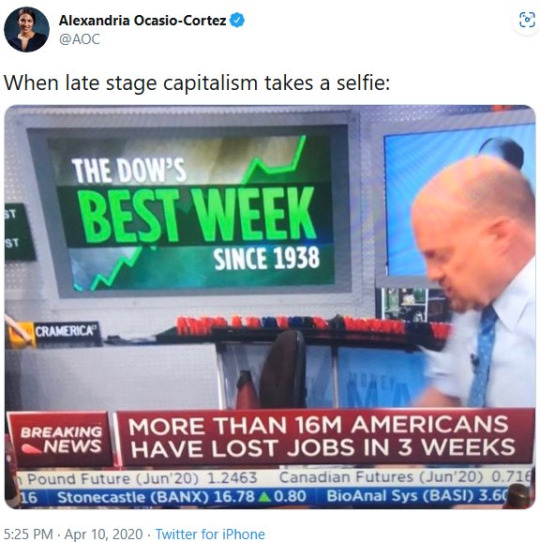
We legit live in hell rn, no big deal
If you go on Reddit or watch corecore edits on tiktok, then there is a sense of dread and irony that's unique to the internet's definition of late capitalism. Since it's a relatively recent thing, there isn't a concrete way to define it, so I'll just use the one given by Ian Neves (Brazilian Historian) in his video about Capitalist Realism because I think it's the one that manages to summarise it the best: Late Stage Capitalism is the stage of capitalism in which the contradictions of capitalism are so evident that they become explicit to the population. That is, it is so in your face that it stops being campy. It's just tacky.
In the video, Neves further explains that one of the big deals about capitalism is that it sells itself as a contradiction-free system, but in our current time we aren't quite fooled anymore. A few examples of this would be multinationals like Amazon opening factories in underdeveloped places like Tijuana, under the guise of wanting to "help develop the country" but placing themselves close to a slum, clearly showing their intentions of exploitation; You can also think of the "art" market of NFTs, which are nothing more than numbers stored in a computer - capitalism touts itself as being a creator of value capable of meeting society's needs, yet there is no need met with NFTs besides value generation for the sake of value generation and pure speculation. Anyway, there are several examples and whatever you think is probably Late Stage Capitalism.
2. The Application in Late Stage Formula 1
Having done this deep dive, imagine my face when I realised that it turns out I didn't just pull "Late Stage F1" out of my ass. I was gooped! Gooped, I tell you. See, if late stage capitalism is now defined as the era in which capitalism's contradictions are explicit, then Late Stage F1 can be easily perceived as the stage of the sport in which its contradictions are no longer capable of being ignored by the fans either. In that sense, it does feel that this is the perfect way to synthesise the bitterness that a large part of the fandom tastes in their mouths.
note: I'm not stating that pre-Liberty Media Formula 1 was perfect. God forbid I become one of the purist fans talking about the good ole days. Bernie Ecclestone wasn't shit and in a way, some of our issues nowadays are inherited from his tenure as the head of FOM. But, at the same time, the sport managed to sell itself as a luxury hobby while still being satisfying and accessible, in a way or another, to the non-wealthy fans. You couldn't see as many contradictions as now because the image of the sport was more or less aligned with what you actually saw, good and bad.
The same, unfortunately, can't be said nowadays. To illustrate my point, let's take a look at FOM's Corporate Strategic plan, released in 2020. The idea, in their words, is "to deliver a more popular, more exciting, and sustainable sport, which pushes the boundaries whilst protecting our heritage.", supported by six axes:
Race – Increase competitiveness and unpredictability on track
Engage – Produce an amazing spectacle for fans on and off track
Perform – Generate value to our shareholders
Sustain – Deliver sustainable and efficient operations
Collaborate – Create win-win relationships with our partners
Empower – Build an engaged and high-performing workforce
Besides Perform and Collaborate, arguably the two most capitalistic inclined pillars, it's incredibly easy to find counter-arguments to illustrate how this is just corporate talk and doesn't actually reflect on the sport. [cracks fingers] So, let's get it:
✷ Increase competitiveness and unpredictability on track: Ok, sure, they try with this one as it is the core of the sport - after all, this is what the regulations' tweaks are for. But you just need a quick overview of the Andretti situation to see that competitiveness only serves the structure to a certain point. After all, although Andretti managed to get the backing of a manufacturer (General Motors, in the form of Cadillac) which, in theory is enough to make it a more legitimate entry less likely to Caterham levels of bankruptcy, the vibes are still somehow off from camp F1.

Michael and Mario Andretti on a pit wall during something that WASN'T a Formula 1 race
This all boils down to the revenue split at the end of the season between the teams and FOM: once you remove the bonuses that are thrown around, roughly 50% of what's left goes to FOM, and the other 50% are the championship prize money (don't quote me on these percentages actually, I'm not sure if it's exactly 50/50) . If Andretti gets in, then either the teams' share gets diluted as a consequence of an extra mouth to be fed, either FOM needs to adjust its own reward to increase the total prize money and make sure that all teams still get the same liquid value for positions 1-10.
Now, Andretti are willing to pay the 200 million dollars "anti-dillution" fee that's to be distributed to the already existing teams as a regulated "sorry we're gonna have to split the prize money in 11 from now on". Yet, instead of welcoming the bid, teams have lobbied for an increase to that fee to 600 millions, a cheap tactic to either get more money or to keep Andretti out. On one hand, Christian Horner has made it clear, from the teams' perspective it is about the money. On the other hand, Stefano Domenecali and FOM are hot and cold, stating that he's happy Andretti are interested but mad that they're calling out the bureaucracy of the process.
The key aspect here is that F1 no longer needs an American team to reinforce their position in the United States market as they did back in 2014 when Haas formalised their entrance. In fact, they don't even need Haas to assert themselves as American anymore as they have three GPs lined up regardless of the team's national fanbase. This way, in FOM's optics, they have nothing to gain from Andretti. In a way, the teams are basically doing what's expected of them, but bottomline is the fact that FOM is fucking mental in adopting the same perspective instead of planning how an extra entry of such magnitude as Andretti-Cadillac could pay itself with time.
✷ Produce an amazing spectacle for fans on and off track: See, I guess you can call me a bit of an old school fan, because when it comes to Formula 1, I WANT TO SEE THE FUCKING CARS RUN ON THE FUCKING TRACK. I suppose many of you are aligned with me on that one.
Using the 2021 numbers as reference since we didn't get the 2022 report yet, the average global audience is around 70.3 million. Given that the biggest venues can only hold 400k attendants tops, the rest of those 70m fans are watching the GPs from home. They are also most likely having to pay for it, since F1TV's dominion keeps increasing. While, all credit is due, F1TV offers a much better pay-per-view experience than many other sports have, with a very rich archive and incredible coverage of each race weekend, some of these prices per country are a legit effort for a fan to make.

From the Reddit post, an example of the price disparity between countries. F1TV is priced accordingly to the purchasing power that each country has.
Could be worse as many other fans are held hostage by Sky Sports, which is only available with a much more expensive £34.99 subscription to UK and Ireland fans, who don't even have F1TV as an alternative option. Given that Sky also has the airing rights in Germany and Italy, the fact is that F1's free to air presence has been lowering over the years (a problem that has been discussed in 2016 and represented a decrease in viewership at the time, mitigated by the Liberty Media efforts). But F1 really can't be arsed in considering a full return to free-to-air TV given the current times and so, the idea is to basically adapt to the pay TV market as much as possible and to retain free-to-air positions in specific markets. And if you, individually, don't have the money to pay for it and there is no free-to-air alternative for you, tough titties.
When it comes to actually attending a Grand Prix though, it's becoming equally harder to do it. The F1destinations 2023 rank shows that there has been an average 56% increase on the average 3-day ticket price in relation to 2019, costing roughly 508 dollars. In terms of affordability, these tickets can represent from under 10% to over 50% of the average monthly net wage for the countries hosting the GP. If it was just the tickets that would be easy peasy, but the fact is most of the times attendance includes the need for housing, transportation, food, etc. What this means is that it's fucking expensive, ok?

The GPs are getting more and more packed, but for how long?
Again, the sport has always been elitist, but there was for a good while a relative balance between your average fan who managed to save up and get a GA ticket with the rich wealthy fans at the paddock drinking their champagne. Nowadays, even people who were regular attendees of their home gps have tapped out due to being priced out. Plus, even the new GPs added to the calendar already come with a big disclaimer "FOR MONEY ONLY" as, for instance, the cheapest tickets for Las Vegas cost 500 bucks but the real average price for the three days is $1,667.
So, if they are in fact producing a great spectacle for fans, it's becoming more and more hard for said fans to actually be able to see it. Whatever.
✷ Deliver sustainable and efficient operations: F1 made a pledge in 2020 to improve their relationship to Mother Nature by 2030, which includes: Net Zero carbon, sustainably-fuelled, hybrid power units, efficient and low/zero carbon logistics & travel, 100% renewably powered facilities and credible carbon sequestration. The whole pdf has a bunch of lovely lines about their grandiose plans, but these are somewhat easily dragged to filth by anyone who understands just a tiny bit of eco-sustainability. One of these people is David Bott, chief innovation officer for the Society of Chemical Industry*.
Bott explains well the situation with the fuel. F1 cars currently use E10, which is a mix of gasoline (+ the likely additives that gasoline already has) with 10% ethanol, a sustainable fuel. The thing is, gasoline is more popular than ethanol for cars for a reason: if you take 1L of gasoline and 1L of ethanol, when you burn them, gasoline will give you way more energy. According to Bott, this means that the new E10 fuel is not as potent as gasoline would be, so you end up needing to use more of it anyway and in the grand scheme of emissions, that means fuck all.
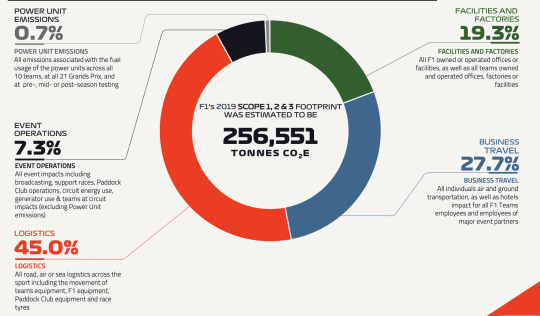
F1's carbon footprint per sector. Does something feel funny to you?
Still, as F1 itself showed in their sustainability report back in 2020, the power unit emissions are less than 1% of the total emissions during a season. As you'd imagine, the thick of it really lies in logistics (45%, transportation of all equipment) and business travel (27,7%, transportation+hotels of f1 staff). Drivers and TPs carpooling with their private jets might help a little bit, but it's evident that F1 doesn't give a single shit about improving those numbers given that the calendar has expanded to 23 races, three of them in the same country but in completely different times of the year, which means that the back and forth of airplanes between continents will correspond to a 15% increase to emissions in relation to last year. According to Paolo Feser, If they were to at least organise the calendar in a sensible manner, they could cut these emissions by half, but such a calendar would go against their contracts with Bahrain and Abu Dhabi for the season's opener (till 2036) and finale (till 2030), respectively. When you consider the pledge's deadline of 2030, it's pretty evident that they'll say they made it because of the drop-in fuel in development, but logistics are far removed from the rest of it.
✷ Build an engaged, high-performing workforce: TALKING OF THE 23 RACE CALENDAR, the biggest impact is obviously on the workforce. Race weekends are gruelling enough for the drivers, who have stated through the GPDA their concerns of burnout. But then, you also have to consider the garage side, who are used to a minimum of 12-hour shifts during a race weekend, having to adapt to more frequent double and triple headers. As an anonymous mechanic said:
"Then, when you are coming home on a Monday morning or Monday evening, and you haven't slept properly in days, that then affects how you feel in your personal time. It means your relationships can suffer – either because you are agitated with your partners or you've got other things on your mind. And that's not fair on you nor them. You are not just mentally fatigued, you are physically drained as well. As the season wears on, there are a hell of a lot of injuries happening. The teams do have doctors and physios to help look after you, but the easiest solution is to pump you with painkillers to just keep you going. There is no way in a million years that a regular doctor would give you what we are given to keep us going."
The psychological strain adds to the anxiety of creating the perfect car and work culture has become increasingly tense. To add to the tension, the cost cap negatively reflected on the workforce as many teams, including RBR and Mercedes, had to fire people to adapt to it. Those who stay have to be reminded that they are "so lucky" to still have a job and if "they don't like it, they can go" (as Tost said in 2021) but the situation is overall so demotivating that yeah, people are quitting motorsports overall or changing categories. To sum up, the engagement and performance of the workforce isn't out of love for the sport, but fear and pressure.
To wrap this with a golden bow, I could never forget the #WeRaceAsOne initiative, still touted by F1 as a campaign that really wants to bring awareness and impact important problems in our society. When it was created in 2020, the main focuses were COVID-19 and social inequalities, but given that they banned T-shirts in podiums in 2020 after Lewis Hamilton protested the death of Breonna Taylor by the hands of US pigs, they clearly weren't comfortable in really tackling the inequality issue. Therefore, they changed the goals of the campaign for a very corporate "Sustainability, Diversity and Inclusion & Community" axis, whatever the hell they mean with that. It's good that they can focus on it all they want, as the FIA has banned drivers from political statements during race weekend procedures. Moreover, while the boycott of the Russian Grand Prix is completely justifiable, it still feels empty once you consider they raced in Saudi Arabia while a factory mere miles away from the track was bombed, also as an act of war.
To sum up, the fact is that late stage Formula 1 is here to stay and we have to deal with all of the sport's contradictions. The same way that late capitalism does not mean that the end of capitalism is near, late stage f1 means nothing as its popularity has been rising more and more, and at the current rate, the abandonment of the older fans means jackshit as more people show up on social media and are willing to pay what's necessary to either watch it or attend races. The question that might linger, in fact, is if F1 has reached the point of inevitability at last?
----
YOU CAN'T RUN AWAY - FORMULA 1 AND CAPITALIST REALISM
1. Mark Fisher's Capitalist Realism
Even when we're faced with the existence of a late stage Formula 1, whether when it's concretely laid down or just a feeling deep down, many of us still continue to engage with it. As much as we complain about it, the current panorama does show an expansion of the sport, which can only happen as well because a good chunk of the old school fans remain. The question is, why do we insist on watching a sport when we know shit is that bad? Is it solely because of affectionate ties to a team, a driver or even f1 itself? Sure, these factors contribute to it, but what if I told you that it is also because current F1 has finally managed to sink into our collective consciousnesses as inevitable?
To understand what I'm trying to say here, we need to look first at the big picture. That is, if we have been treating F1 as a microcosm of capitalism up to this point, it's now necessary to step back and face Capital itself. In order to do this, I want to introduce to you guys the concept of capitalist realism.

Say hello to Mark Fisher (1968-2017), an incredible mind gone too soon
While, just like late stage capitalism, "capitalist realism" was an umbrella term used for a myriad of different meanings, we don't have to contextualise its timeline. Rather than that, we can jump straight to Mark Fisher's defining work, "Capitalist Realism: Is There No Alternative?", published in 2009. In it, Fisher defines it as "the widespread sense that not only is capitalism the only viable political and economic system, but also that it is now impossible even to imagine a coherent alternative to it". Putting it in simpler terms, it's easier to imagine the end of the world than the end of capitalism.
With capital realism, Fisher no longer talks just about the influence of capitalism at a socio-economic level, but also how it bled into the cultural and psychological spheres (scary!!!!!!!). All of this culminates in apolitical attitude towards capitalism: since we can't escape the system because things are like this, all we can do, realistically, is to adapt to it and try to minimise its effects instead of actually fighting them.
Having that in mind, I ask you guys: can you imagine the demise of F1? We often hear about it separating from the FIA, but similarly to capitalist realism, Formula 1 losing its world championship status (as close to its end of the world as it gets) feels more likely that a massive restructuring of the category or it shutting down for good. Similarly, fans have adopted an "it is what it is" point of view towards the sport as we all know what FOM and the FIA are like and we don't have, supposedly, the power to change anything, we just have to suck on whatever they propose to us.

Stefano Domenicali (FOM CEO) and Mohammed bin Sulayem (president of the FIA), joined in unholy matrimony
Now, capitalist realism didn't show up out of the blue. According to Fisher, neoliberalism was the mother of capitalist realism. This is because its campaign in the 80s and 90s with regan and maggie thatcher (names in lowercase because I don't respect them) was successful in gaslighting people into thinking that it wasn't necessarily perfect, but it was the only approach of government rooted in reality. Once it was implemented, the next step was to consolidate it, which happened thanks to two factors: the end of the soviet union and the transition to post-fordism. I know this seems crackheaded and with no relation to F1, but give me a chance pls!

Trigger warning: the many faces of neoliberalism
During the Cold War, there was a concrete antagonist to capitalism in the shape of the USSR*. With its demise, this role of a real opposition to it was completely obliterated, allowing for capitalism to expand however it pleased without anything to contest it. Similarly, maybe F1's biggest triumph in these last two decades - and this is why I said at the top that Bernie wasn't shit and the problem about late stage F1 had its roots further back - is that it successfully managed to free itself from the sole category that threatened its popularity: Indy Car.
*note: by stating this, there is absolutely no value judgement. the statement is not about the ussr being a problematic fave or a communist hell that needed to be abolished. it was just a physical entity that asserted itself as a possible alternative to capitalism. by its physical existence, it allowed for public consciousness to understand that, if the ussr was a possible alternative to capitalism, then there might as well be plenty of others. kindly remember that the ussr was quite oppressive and countless people and countries suffered on their hands, while also understanding that for this particular purpose, it did its job.
2. The IndyCar Situation
The IndyCar World Series as we know it was established in 1979, with CART (Championship Auto Racing Teams) as the governing body behind it. The similarities between F1 and IndyCar went beyond the cars (although the Indys were a tad less sophisticated than F1s): the creation of CART itself was based on Bernie's FOCA model (television rights, sponsorships, etc).
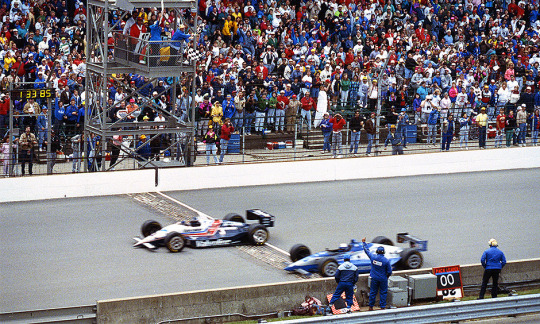
IndyCar's Indianapolis 500, 1992. Not bad in terms of attendance!
From the 80s, its popularity grew in America, with them even inheriting venues that originally held grand prix, like Long Beach. Still, no one was really intimidated by them as F1's presence in the US, albeit messy with several different events attempted, was constant during that period. However, shit went down in the next decade, when Formula 1 was shut down by the organisers of the US Grand Prix at Phoenix right in 1991. From that point, it would take 9 years for F1 to get back, at the heart of American racing, Indianapolis. Hold this information.
Once F1 disappeared from 'Murica, IndyCar thrived, at least for a while. CART had managed to join ACCUS (Automobile Competition Committee for the United States), who are affiliated to the FIA, which made it possible for drivers to race in Indy without losing their super licenses. Soon, there was a migration from foreign drivers to IndyCar, and that included people from F1, such as Emerson Fittipaldi. Once that happened, the sky became the limit for Indy and they started to race outside of the US. By 1993, Nigel Mansell had dropped F1 after a rift with Williams and decided to go drive for Newman/Haas at IndyCar instead.
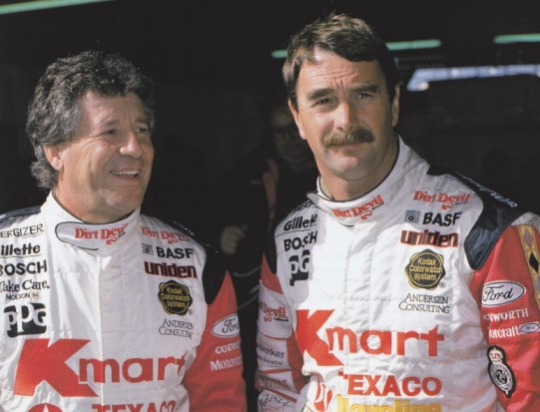
Nigel Mansell and teammate Mario Andretti. Oh how I want Nigel, ngl.
note: the motherfucker demolished his competition, won IndyCar and is still the only person to be, technically, F1 and IndyCar champion at the same time.
At this point, some people will say Bernie Ecclestone wasn't bothered, but he hadn't even gotten over losing the Long Beach GP to CART back in 84. You know Bernie, I know Bernie, we all know Bernie. HE WAS MAD!!!! At the same time, NASCAR was rising in popularity like never before, causing a certain rivalry between the categories over who would take over the hearts of all the petrol head americans.
Enter Tony George, then head of the Indianapolis Motor Speedway and chairman at CART. Tony believed that CART was getting lost in the game and ignoring Motorsport Traditions by racing in venues that weren't ovals. Since Georgy was annoying as fuck, CART booted him from the board of directors, which was one of the most stupid decisions given that he owned the track that literally gave the name to their championship. IndyCar's whole thing was the Indianapolis 500, right? "So fuck you too," Tony George cried while being thrown away from the CART offices by security "You don't want me? Then you don't get to race the Indy 500 anymore!".
Well, it didn't happen exactly like that. Instead, Tony George created a separate category called Indy Racing League that would be dedicated exclusively to ovals and get to be the owner of the Indy 500 from 96 onwards. The original IndyCar series changed its name to CART and Indy racing in America became fractured. Just to be clear, IRL did allow an 8 CART car limit to compete at Indy 500, but CART decided to boycott the event instead. This worked for some time, and CART still managed to make do with their reserves (they even offered to buy F1 in 1998) but soon these started to dry out as sponsors dropped the series and teams started breaking the boycott to race in Indy 500, eventually by the 2000s completely defecting to IRL. In 2004, CART filed for bankruptcy and got bought out, living as a zombie series until 2008 when IRL bought it and reunified them. At this point, the damage was done as NASCAR had taken over in popularity and F1 was back since 2000, racing the IMS.

Tony and Bernie, BFFs 5eva
Oh yeah, haven't you heard? 1998 also marked the year where it was announced by Bernie that F1 would come back to the United States, racing at the holy land of Indianapolis herself. Sounds sketchy? You're not the one to think that, as both Jacques Villeneuve (1995 IndyCar champion 1995) and Gordon Kirby (journalist, US correspondent for Autosport 1973-2004) have stated that Bernald, alongside NASCAR boss Bill France, basically whispered sweet nothings in Tony George's ear to get him to act a fool. Although it took several more years for F1 to finally sink its teeth into the United States in an effective manner, the main competition was out before they could even expand further.
It was up to Formula 1 then to expand without anything to stop it, as we can see in the many calendar changes we've had over the years. Even further, since there is no antagonist, this has also allowed F1 to turn its sights to the feeder system, creating its own "preferred" path that, with the super license points system basically make it harder for drivers who are outside of the F1 feeder series bubble to make it to F1 (as we've even seen recently with Colton Herta). Same thing is happening to the W Series, which for lack of funds wasn't able to finish their 2022 season even though they were promoted to an F1 support championship, racing. While Formula 1 did not offer to help them or tried to integrate them properly in the feeder series ladder, they have just recently announced F1 Academy, their own initiative for female drivers, placed officially just under Formula 3 with a direct link. That's great for the female drivers, but incredibly fucked up at the same time.
3. Was There Ever Class Consciousness in F1?
Yeah, so the whole lack of opposition didn't help on an external basis, but there is also an internal factor that cannot be ignored and it's linked to post-Fordist work structure. In Capitalist Realism, Mark Fisher cites a study by Richard Sennett called "The Corrosion of Character: The Personal Consequences of Work in the New Capitalism". In it, Sennett states:
"Where formerly workers could acquire a single set of skills and expect to progress upwards through a rigid organizational hierarchy, now they are required to periodically re-skill as they move from institution to institution, from role to role. As the organization of work is decentralized, with lateral networks replacing pyramidal hierarchies, a premium is put on ‘flexibility’.[...] This flexibility was defined by a deregulation of Capital and labor, with the workforce being casualized (with an increasing number of workers employed on a temporary basis), and outsourced."
Translating this, instead of becoming a specialist on something, you become a jack of all trades without any job stability. In the F1 world, this is seen not only in drivers changing teams and getting sacked of the category altogether, but also in the poaching of talent between teams and the frequent internal restructurations. Ian Neves says that post-Fordism was key in the establishment of capital realism because its natural consequence is the individualisation of work, which leads to the weakening of trade unions and ultimately, the mining of class consciousness.
As one would expect, there isn't a trade union that looks after all F1 workers. Instead, most of the engineers, mechanics and other staff are subject to the unions of the countries the factories are located at (for instance, Alpine is protected by the "collective convention of metallurgical engineers and workers").Therefore, as much as the personnel is against work conditions and calendar expansion, it's much more difficult for them to unite and rally against it as they have been segmented.

Ferrari team photo, 2022. Together, but divided nevertheless
This is particularly fucky when you consider the existence of the GPDA. The Grand Prix Drivers' Association is a trade union that, historically, has made itself heard in delicate situations where drivers needed to claim their rights and fight for their safety. Unfortunately, this comes with a side effect that reinforces a difference between drivers from the rest of the F1 crew. While they are absolutely right and the GPDA should exist as a trade union regardless of the existence of a larger one encompassing all workers, the fact is that the illusion that drivers are in the status quo of the sport, and not subject to it, remains.
Look, as much as they are in a privileged spot and reap all its benefits, the fact is they do not own the cars they run - well, at least not most of the time [stares at the Strolls]. They still rely on the teams that own the structure and the backing of sponsors, that is, the means of production, to work. Most of the time, when they retire from F1, they still tend to race in other categories or find side quests. While I have no doubt that drivers are super passionate for racing and you can't completely quit it, how much are we sure that this is also not partially motivated by the desire to make sure they are still able to afford the lifestyle they had as Formula 1 drivers? Marx was clear, baby, the drivers are as much the proletariat as anyone else. By separating them from the rest of the structure and maintaining the post-fordist work structure for the rest of the teams, class consciousness inside the paddock is close to none and it helps to consolidate F1's status as an almighty being.
4. The Illusion of Abu Dhabi
Here's the thing: if "realism" is used as an argument for maintenance of the current state of affairs, by conforming to what's in theory "realistic", then the best way to threaten it, according to Fisher, is if you manage to expose the cracks of said "realism". This should be able to work because, get this, there is a difference between what's Real and what's reality.
Again, sorry but I'm gonna get theoretical here. However, when you consider that so much of what we're talking about here directly relates to a psychological sphere, you can't not add some psychiatric theory into this. When you look at it from the point of view of Jacques Lacan (French psychiatrist who spit some bars), reality is constituted not of what's actually Real, but of social conventions and symbolism. The Real itself is unrepresentable and even traumatic at times, and you can only perceive it when you look at the inconsistencies of reality, that aims to suppress it! What the fuck!!!!
It's super easy, you just have to show that the whole framework is inconsistent!
Except it never works that way.
Going back AGAIN to capitalist realism, take a look at the 2008 Global Financial Crisis. I don't understand much about the mechanisms of the economy (and I am right not to, as this is all made up by weird people), but even I know that the Lehman Brothers collapse resulted in a worldwide clusterfuck that saw many lose their lifetime of savings. After that point, the ripple effect was so severe that companies were falling like flies and it was up to State interventions to halt things. Maybe the greatest example of late stage capitalism, this was the key point to explicit the greatest contradiction of neoliberalism: they sell themselves as a system above the State, however they needed the State to save it, which means they don't really want to abolish State, just to occupy it to their own desires.
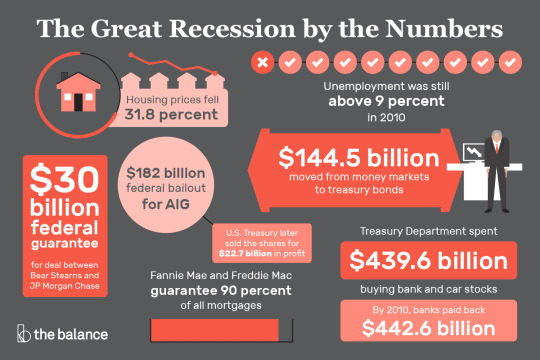
The absurd numbers of the financial crisis in the US.
So, you have your reality cracked, you can look at the Real and see the inconsistencies of capitalism laid bare in front of all of us. This should have been enough for neoliberalism/capitalism to go out of style completely right? As you can see if you look out the window, however, we're still living in a capitalist society. Then what happened? The crises ended up reinforcing the status of capitalism precisely through the bank bail-outs as the States doubled down on the whole "realistic" thing because they had no alternative and saw these companies as "too big to fail". What we see today, then, is an economical model that clearly fallible, yet remains because it's perceived as a default. Mark's words, not mine.
But this is in the field of Capital. It's not like, in the F1 bubble, anything of the genre has ever happened.
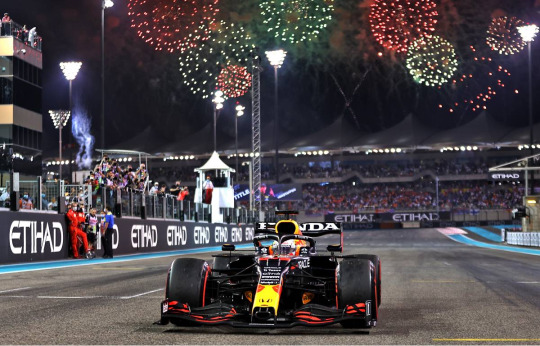
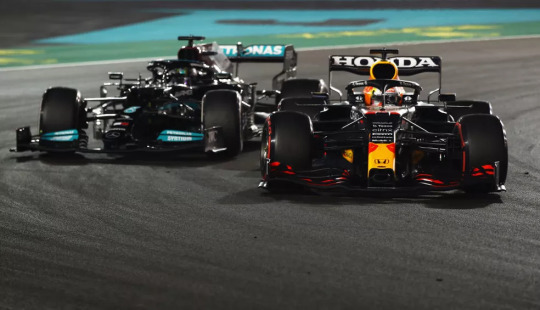

Yup.
I guess you could say there have been moments in Formula 1 that came close to exposing these inconsistencies but didn't, like crashgate, spygate or the whole 1989 championship debacle. Still, these didn't expose anything because:
1) F1 didn't sell itself at the time of those events the same way it does now
2) All of these could be easily pinned to individuals instead of the whole structure of F1 itself - even Senna put 1989 on the back of Balestre only, instead of the entire FIA.
Abu Dhabi, however, wasn't looked at the same way given that it's still such a controversial topic and was the point of rupture to many fans with the category.This is because the series of events that led to Abu Dhabi, touted as the biggest showdown since 1974 and followed it afterwards managed to create the circumstances to break the veil between the reality (F1 as the greatest, most spontaneous motorsport modality in the world) and showed the Real (the newfound need to push narratives, consequence of the transition from sport to entertainment encouraged by Liberty Media ran-FOM, enabled by the FIA and accelerated by Drive to Survive).
The animosity between TeamLH and the Orange Army lingers to this day. However, regardless of its peak at the time, the controversy of the actions taken at the Grand Prix did not provoke just an outcry amongst Hamilton fans, but to a good chunk of neutral parties as well. We're still here though, so how did Formula 1 manage to escape from it? Simple, they also reinforced their position by the immediate actions of the FIA, as Jean Todt demanded a review of what happened. In its swiftness to respond, the World Motor Sport Council, that is, the one institution that could bail-out F1, states they would take action to understand what happened and avoid any problems in the next season.
The bail-out, in this sense, isn't monetary, but institutional as they place their focus on the "relevant parties" instead of the major structure itself. From their side, FOM avoided taking responsibility for their role, as Domenecali said right after that "We have already spoken with the president [Mohammed bin Sulayem, who had just assumed his role] . We talked about the priorities he will have to face, and there are many.". This landed as well, as the common reaction was to demand the FIA changes and penalties, blaming Michael Masi for "trying to balance the need for spectacle with the rulebook" instead of addressing the root causes of the need for spectacle itself.

Masi had it coming, but he sure made it easy from the FIA and FOM
In that sense, the reinforcement also comes in the sense of self-criticism, since it leads to something called "interpassivity", a concept developed by Robert Pfaller: when the actors in Formula 1 take it to themselves to discuss and criticise the sport themselves, they are performing our opposite stance for the fans, who then are able to continue to consume it as they please. This is possible as well because we take a "cynical distance" from the sport and thus become passive spectators. This way, as long as we say to ourselves "oh, F1 is rotten nowadays", that's all we need as a cop-out to keep watching it. This is not just us being hypocrites, per se, but legit one of capitalist ideology as Zizek puts it that we overvalue our internal beliefs in detriment of our external actions - literally the "there is no ethical consumption in capitalism" of it all. It's inevitable we replicate this behaviour when it comes to watching Formula 1.
So, once we get all of the way, the question remains: is there anything that can be done to truly change Formula 1? It's not just a matter of direct action, as what we're talking about here is a result of a concealed mulit-layered internal organisation that acts on an abstract level. As much as we can bitch and moan, fan protests and team appeals are direct action and thus, easily countered by the FOM/FIA complex. Hell, these two fight all the time and yet any crisis is easily fixed, as just the mere possibility of F1 separating from the FIA was enough to get bin Sulayem to step away from day to day administration. On one hand, FOM doesn't want to truly separate from the FIA, they just want to occupy the FIA themselves. On the other hand, the FIA needs F1 to stay so that they can continue to assert themselves as the big dawgs in motorsports. This is how they manage to walk hand in hand and compromise over their own interests instead of the interests of the sport itself.
Maybe, this triumph of FOM is directly related to the biggest weapon of capital realism: the individualisation of the being, placing their responsibility and expectations solely on the self instead of the greater structure. This can be seen in situations such as the climate change approach, focused way more on our need to recycle than the large corporations' impact on the environment. Another example is the approach of mental health, that most of the times places on your brain alone the responsibility for your disorders instead of considering as well the influence of social conditions.
In the context of F1, the individualisation is exacerbated by the nature of the competition. Everyone is fighting for their own interests, and in a way, that has always been the goal. Still, the excessive encouragement of rivalries and toxicity - not only in the fandom, but in the paddock itself - serves the role of segmentation very well and helps FOM to continue pushing through F1 as they please. It all boils down to the lack of class consciousness between ALL the personnel, who could adopt strategic approaches that directly affect FOM's directives, turning what was abstract into a concrete issue and thus making it possible to take direct action. (tbh many of these issues can be addressed if capitalism itself is fought but then again, the impact of that on the vroom vrooms can be quite extreme and maybe that's asking too much of a sport dominated by car manufacturers and such).
In the role of fans, we both reflect the inner machinations of Formula 1 and feed it. Thus, the same way that all the staff should unite, so should we. While when it comes to track action many of us are rivals, and some of the drivers legit make it hard to stand with them, fact is the real enemy at the current date is FOM - even if Liberty Media sells it, the next administration will most likely double down on their approach. Our best hope isn't to boycott F1, but to encourage the union of its staff and show that while we welcome the technical evolutions, the main goal must be preserved. Food for thought, really. In the meantime, thank you for surviving till the end! As always, screw you guys, I'm going home!
In the role of fans, we both reflect the inner machinations of Formula 1 and feed it. Thus, the same way that all the staff should unite, so should we. While when it comes to track action many of us are rivals, and some of the drivers legit make it hard to stand with them, fact is the real enemy at the current date is FOM - even if Liberty Media sells it, the next administration will most likely double down on their approach. They were the ones that created the conditions for Abu Dhabi to happen, they are the ones that benefit the most from the rifts. Our best hope isn't to boycott F1, but to encourage the union of its staff and show that while we welcome the technical evolutions, the main goal must be preserved. Food for thought, really. In the meantime, thank you for surviving till the end! As always, screw you guys, I'm going home!
#hyperfixation corner#late stage capitalism#capitalist realism#cheers you guys good luck to those who read it#most normal ana formulinos write-up moment
315 notes
·
View notes
Text

From “Is It Me or Society? I Can’t Tell:” Memphis Hip-Hop and the Slow Cancelation of the Future" by Walker Armstrong
38 notes
·
View notes
Note
Vitriol aside, the people who criticize lancer re: Union are right about one thing: a better world is not for us. Any real good in this world is already twisted and corrupted beyond all repair, and so are all of us. We collapsed the only tunnel out of the cave quite a while ago.
I cannot stress enough that this opinion/attitude is literally everything I have been talking about. When I'm talking about how pervasive capitalist realism is, how pervasive the belief that capitalism has won and we're all fucked is, this is what I'm talking about. That narrative only benefits one group, and it's the capitalists; if they convince us that there's no hope, then it's much more likely that we'll lie down and rot while they steamroll us than rise up to make real changes, whether through a ballot or through revolution.
There are nearly eight billion people on this planet, and 90% of them are being screwed over by the systems we live under, more than enough to change the world for the better. It's just that most of them either A) have been duped into thinking the system benefits them, B) don't know what to do about it, or C) don't believe they can do anything about it.
Capitalist realism may be the single most insidious tool that the ruling class can use against us. The second we all surrender and accept the status quo is the second that it becomes true and the world ends. Don't fall for it. Don't sink into despair. Don't lie down and rot when a better world is possible.
I'm begging you. A better world is possible, and we can reach it if we try.
A better world is possible. Even if we have to fight for it.
#lancer rpg#lancer#lancer ttrpg#mecha#late stage capitalism#politics#a better world is possible#capitalist realism#anti capitalist#socialism#ask
140 notes
·
View notes
Text

Gerhard Richter — S. with Child (oil on canvas, 1995)
200 notes
·
View notes
Text
I saw this post making its rounds on here about how its so bad that we as young people arent participating in traditions and how participating in them and how thats our parent’s fault but also participating is a privilege we dont have. I thought yeah i can get behind that. until i read the line about china cabinets, sunday barbecues and collectables. like no traditions arent objects you collect or gaze upon in your home mortgaged at a low interest rate. no thats consumer capitalism baby
#capitalism#capitalist realism#the sunday bbq is kinda a tradition as defined as a thing you do that makes you closer to your community#although it is def a suburban white tradition
38 notes
·
View notes
Text
"Climate change and the threat of resource-depletion are not being repressed so much as incorporated into advertising and marketing. What this treatment of environmental catastrophe illustrates is the fantasy structure on which capitalist realism depends: a presupposition that resources are infinite, that the earth itself is merely a husk which capital can at a certain point slough off like a used skin, and that any problem can be solved by the market."
Capitalist Realism, Mark Fisher
199 notes
·
View notes
Text
The slogan which sums up the new conditions is ‘no long term’. Where formerly workers could acquire a single set of skills and expect to progress upwards through a rigid organizational hierarchy, now they are required to periodically re-skill as they move from institution to institution, from role to role. As the organization of work is decentralized, with lateral networks replacing pyramidal hierarchies, a premium is put on ‘flexibility’. [ … ] The values that family life depends upon - obligation, trustworthiness, commitment - are precisely those which are held to be obsolete in the new capitalism. [ … ] The situation of the family in post-Fordist capitalism is contradictory, in precisely the way that traditional Marxism expected: capitalism requires the family ( as an essential means of reproducing and caring for labor power; as a salve for the psychic wounds inflicted by anarchic social-economic conditions ), even as it undermines it ( denying parents time with children, putting intolerable stress on couples as they become the exclusive source of affective consolation for each other. )
mark fisher, capitalist realism
640 notes
·
View notes